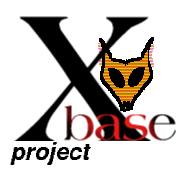Expression Handling
Chapter Updated 3/12/04
Overview
The main objective of this chapter is to provide information regarding the
basic concepts of using the Xbase Expression module.
Beginning with release 1.7.4, the Xbase library includes an expression parsing
routine which assists application programmers by providing a high level data
manipulation tool and also allows for building complex index keys.
The functions included were derived from dBASE III Plus, but not all
dBASE III Plus functions have been implemented yet.
Release 3.0 brought some upgrades to the expression module of the library
including bug fixes, additional operators and new functions. The expression
module is usable and functional, but has some room for improvement.
A future release of Xbase will include more comprehensive expresion logic.
Internal fuctioning
The expression module works in two phases. Firstly, method
ParseExpression is called and builds an expression tree from
all the components of the expression. The tree is made up of indivdual
nodes. The expression is checked for valid field names, literals,
operands and functions. Any field references are resolved. If fields
are used in an expression and the database name for the field is not
included in the name with the -> operand, the routines assume the
associated database has been successfully opened.
Secondly, method ProcessExpression is called to process the
expression tree created by ParseExpression(). The routine parses each
node in the expression tree, executing functions, processing operands
and manipulating data to produce the desired result.
If an expression will be processed repeatedely, it is best to pre-parse the
tree using ParseExpression, then for each new call to the expression,
execute method ProcessExpression which processes the tree.
Expression Return Types
Expressions will return a type of CHAR *, NUMERIC or LOGICAL.
An expression return type can be determined with method
GetExpressionResultType after parsing it.
Expressions returning a return type of CHAR are limited to a 200 byte internal
buffer. There is also a 100 byte limit for NDX index key support. If
the 200 byte limit is not large enough for your application, adjust field
enum { WorkBufMaxLen = 200 }; in file exp.h.
Expression Functions
Each expression function also has a corresponding C++ function. It is
slightly more efficient to call the C++ functions directly, rather than
execute the expression parsing routines.
Expression Components
Expressions are made up of one or more tokens. A token is one of literal,
database field, operand or function. Literals are either numeric or character.
Character literals are enclosed in 'single' or "double" quotes. numeric
literals are a series of one or more contiguous numerals, ".", "+" or "-'".
A field is simply a field name in the default database, or is in the form
of database->fieldname.
Sample Program Demonstrating Expression Processing
/* expressn.cpp */
#ifdef DOS
extern unsigned _stklen = 40000;
#endif
#include <xbase/xbase.h>
xbSchema MyRecord[] =
{
{ "FIELD1", 'C', 20, 0 },
{ "FIELD2", 'C', 20, 0 },
{ "NAME", 'C', 10, 0 },
{ "DOUB1", 'N', 7, 2 },
{ "FLOAT1", 'F', 8, 3 },
{ "DATE1", 'D', 8, 0 },
};
xbShort rc;
xbXBase x;
xbDbf d( &x );
XB_EXPRESSION *e;
/****************************************************************************/
xbShort MyExpressionProcessor( char * Expression )
{
xbShort rc;
char type;
if(( rc = x.ParseExpression( Expression, &d )) != 0 )
{
cout << "\nParse Error " << rc;
return rc;
}
e = x.GetExpressionHandle();
if(( rc = x.ProcessExpression( e )) != 0 )
{
cout << "\nError processing expression rc = " << rc;
return rc;
}
type = x.GetExpressionResultType( e );
cout << "\nExpression " << Expression << " produced result = ";
if( type == 'C' )
cout << x.GetStringResult();
else if( type == 'N' )
cout << x.GetDoubleResult();
else if( type == 'L' )
cout << x.GetIntResult();
else
cout << "\nUnknown result type " << type;
return 0;
}
/****************************************************************************/
main()
{
e = NULL;
d.CreateDatabase( "TEST", MyRecord, OVERLAY );
d.BlankRecord();
d.PutField( d.GetFieldNo( "FIELD1" ), "TESTA " );
d.PutField( d.GetFieldNo( "FIELD2" ), " testb" );
d.PutField( d.GetFieldNo( "DOUB1" ), "200.33" );
d.PutField( d.GetFieldNo( "FLOAT1" ), "100.00" );
d.PutField( d.GetFieldNo( "DATE1" ), "19980101" );
d.AppendRecord();
/* process 3 simple expressions */
MyExpressionProcessor( "FIELD1+FIELD2" );
MyExpressionProcessor( "FIELD1-UPPER(FIELD2)" );
MyExpressionProcessor( "5+TEST->DOUB1" );
d.CloseDatabase();
return 1;
}


